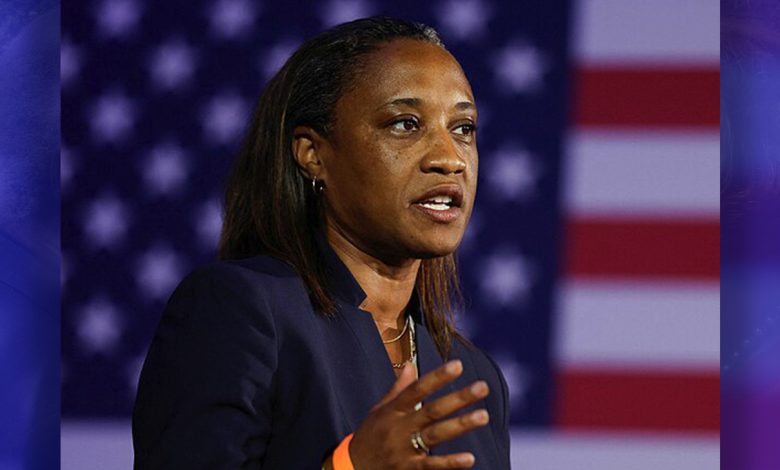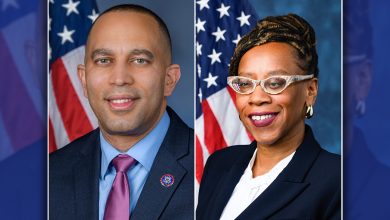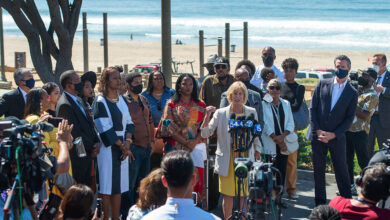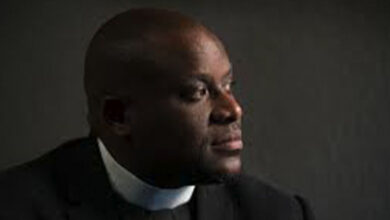Laphonza Butler Becomes California’s Newest U.S. Senator

Replacing the Late Sen. Dianne Feinstein, Butler Becomes the 3rd Black Woman to Serve in Upper Chamber
By Lauren Victoria Burke,
NNPA Newswire contributor
Two days after California Gov. Gavin Newsom announced that Laphonza Butler would fill the U.S. Senate seat of the late Dianne Feinstein, the new senator was sworn in on Capitol Hill by U.S. Vice President Kamala Harris.
Flanked by Senate Majority Leader Chuck Schumer and California Sen. Alex Padilla as she took the oath, Butler than received a round of applause by senators of both parties.
After the swearing-in, President Joe Biden called Butler to congratulate her, the White House said.
“I am honored to accept Gov. Newsom’s nomination to be a U.S. Senator for a state I have long called home,” Butler said in a statement Monday. “I am humbled by the Governor’s trust. Sen. Dianne Feinstein’s leadership and legacy are immeasurable. I will do my best to honor her by devoting my time and energy to serving the people of California and the people of this great nation.”
She will be the third Black woman to serve in the U.S. Senate, preceded by Illinois’s Carol Mosely Braun, and current V.P. Kamala Harris. Butler is also the first openly lesbian Black U.S. senator: Her wife, Neneki Lee, held the Bible during Butler’s swearing-in.
Since 2021, Butler has been serving as the president of EMILY’s List. The fundraising platform supports and funds women candidates and amplifies issues that disproportionately impact women.
Before that she was involved in labor organizing, elected president of California’s largest union, Service Employees International Union (SEIU).
“As the president of SEIU 2015, Laphonza Butler led the fight for fair wages and respect for home care workers,” said Mary Kay Henry, current SEIU president, in a statement Monday. “As president of SEIU California, she was a driving force in winning the first statewide $15 an hour minimum wage in the nation. She has been a strong ally electing pro-women candidates as president of Emily’s List.”
Fellow California Sen. Alex Padilla also expressed strong support for Butler. “Throughout her career, Laphonza Butler has been a strong voice for working families, LGBTQ rights, and a champion for increasing women’s representation in politics. I’m honored to welcome her to the United States Senate,” Padilla wrote in a statement. “Governor Newsom’s swift action ensures that Californians maintain full representation in the Senate as we navigate a narrow Democratic majority. I look forward to working together to deliver for the people of California.”
Newsom’s decision was not on the political radar screen of most prognosticators.
With the selection of Butler, the decision by California’s Governor did not include any of the currently announced candidates for U.S. Senate in 2024 in California. Those current candidates include veteran members of Congress Barbara Lee and Adam Schiff and relative newcomer Katie Porter.
“As we mourn the enormous loss of Senator Feinstein, the very freedoms she fought for — reproductive freedom, equal protection, and safety from gun violence — have never been under greater assault. Laphonza will carry the baton left by Senator Feinstein, continue to break glass ceilings, and fight for all Californians in Washington, D.C.,” wrote Gov. Newsom in a statement released on the evening of October 1 announcing Butler’s appointment.
Butler will be the only Black woman in the Senate. But Delaware Congresswoman Lisa Blunt Rochester is expected to win the Senate seat vacated by Senator Tom Carper. Carper announced he would not run for re-election in 2024 and Rochester announced shortly afterwards that she would run for Carper’s seat.
Butler formally became another addition to the Congressional Black Caucus when she was welcomed with a swearing in by those members later on Tuesday.
Butler grew up in Magnolia, Miss., one of four siblings raised by a single mother. Her father, who suffered from heart disease, passed away when Butler was 16. She attended Jackson State University, an HBCU, graduating in 2001.




